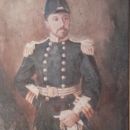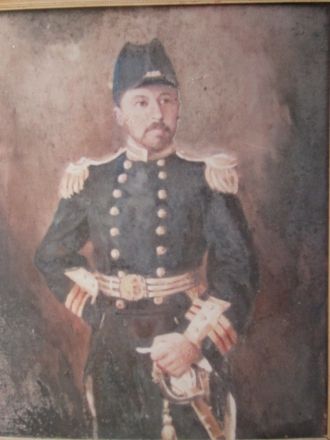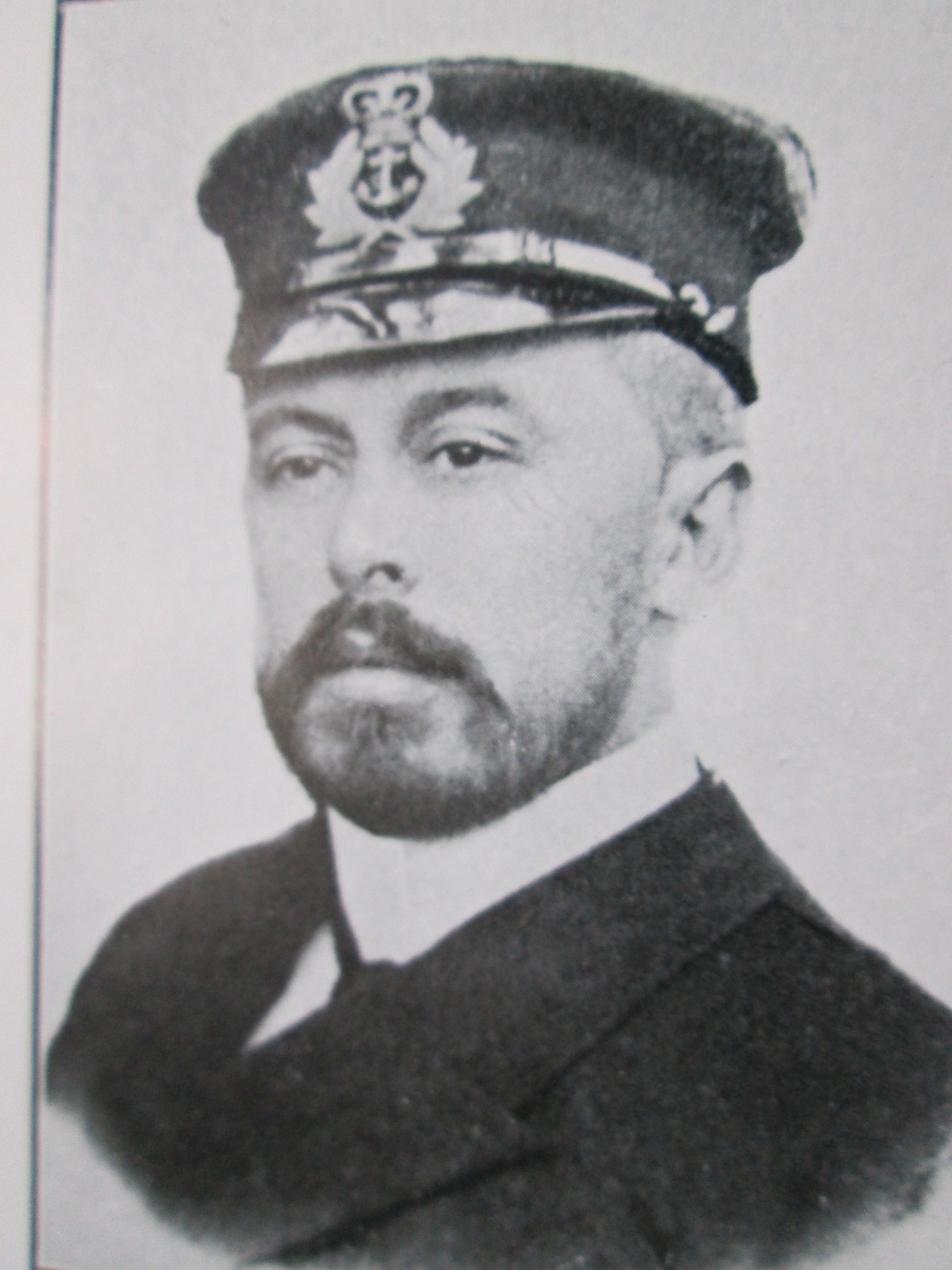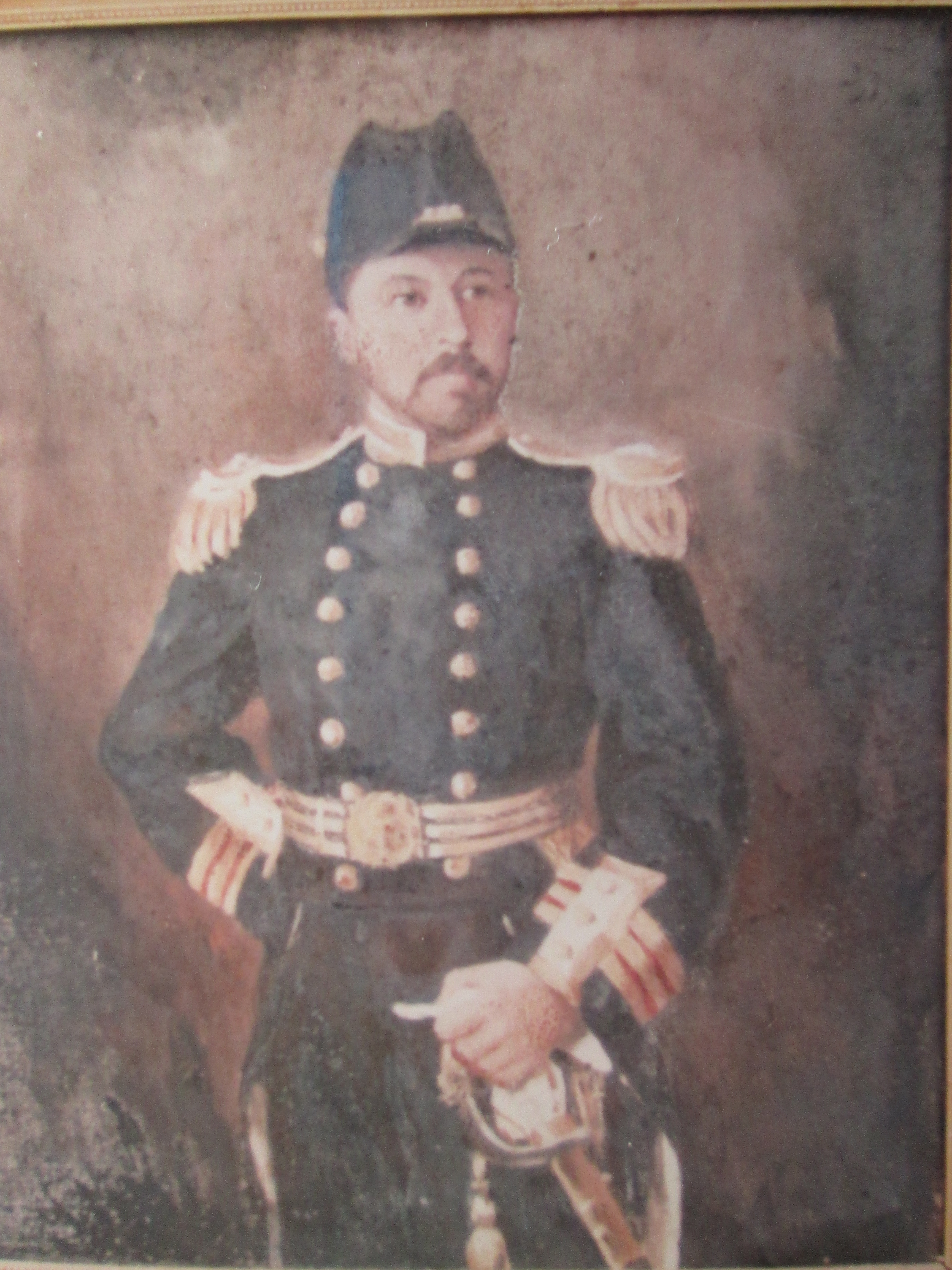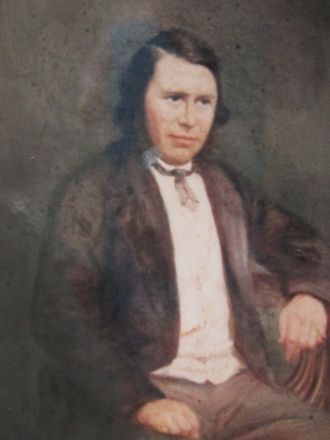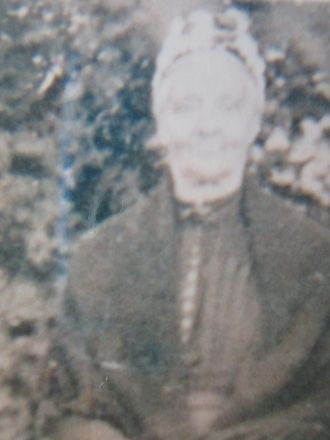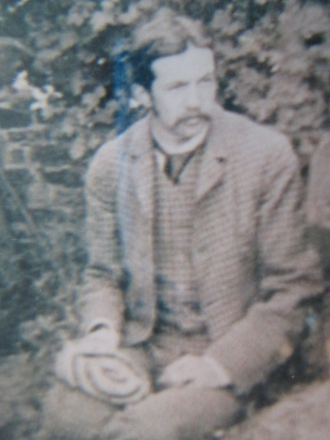From “THE WATERS OR WALTER FAMILY OF CORK.” by EATON W. WATERS, M.B., M.A.O., M.Ch. (brother of George Alexander Waters) Page 41-42.
George Alexander, born 28 Sept., 1862, educated at Waterford High School, Carmichael College, Dublin, and University College, Galway, graduated M.D. and M.Ch. in the Royal University of Ireland in 1884. He obtained second place on entering the medical service of the Royal Navy, his commissions being dated, Surgeon 1887, Staff-Surgeon 1899, and Fleet-Surgeon (Surgeon-Commander) 1904. His services in home waters included a commission in H.M.S. Hearty, Commander W. Wilson, in the North Sea at the time of the cession of Heligo-land to Germany, and in the same ship he attended the festivities at Sunder¬land in connection with the memorial to Jack Crawford, a seaman of H.M.S. Venerable, Capt. Geo. Fairfax, bearing the flag of Admiral Duncan, who when the colours had been shot away nailed them to the mast at the battle off Camperdown in 1797. He went to the antipodes in H.M.S. Boomerang, Lieut-Commander Fenton, one of Australia's first ships, in which he visited and was feted in all her ports, and engaged in a joint punitive expedition with the French warship " Scorp " to one of the South Sea Islands, where white traders had been murdered, besides calling at many of the other islands. He spent three years in the Danube in H.M.S. Cockatrice, a ship noted in the Service for a free and easy life away from the ken of an admiral. It was current in his time that the Admiralty having sent certain communi¬cations to her then commanding officer and failing to get any response, at last sent out a special messenger who found that all the commissioned officers were away on a shooting expedition ! In the Pacific he served in H.M.S. Psyche, cruising chiefly amongst the West Indian Islands, and was present when she was sent to represent England at the celebration of Cuban independence, a memento of which was sent to him afterwards in the shape of a fictile vase of native manufacture, which is now at Brideweir. In 1905 he was in H.M.S. Illustrious, attending the Brest fetes in honour of the entente cordiale. In H.M.S. Drake he went to New York in the special squadron of Admiral of the Fleet, Sir E. H. Seymour, sent to attend the Hudson-Fulton celebrations in 1909. Both in France and in the United States they were treated right royally, and many small souveniers of these historic occasions are at Brideweir. When the Great War broke out in 1914 he had almost completed his three years as P.M.O. at Whale Island (Portsmouth), the headquarters of the Naval Gunnery School, from whence he was appointed to H.M.S. Goliath, Capt. Thos. Shelford, a battleship of 12950 tons, which in Nov. blocked the German light cruiser Konigsberg into the Rufigi River, and subsequently bombarded Dar-es-Salam, the capital of German East Africa. Although on the point of retirement he wrote that he would not have missed the War for a double pension. In April, 1915, the Goliath took part in covering the landing of the Allied Armies on the Gallipoli peninsula. On the 12-13 May, while engaged in the dangerous task of protecting the right flank of the French Army, she was struck by three torpedoes and sank in two minutes. The night was pitch-dark and only 166 survivors were picked up. It was the turn of the French Destroyers to protect the battleships and as the Turkish Destroyer was of identical design, having been built in France before the War for the Ottoman Govern¬ment, she was mistaken for one of them and allowed to approach.1
Unmarried, free from pettiness and a ripe scholar without a trace of pedantry, Fleet-Surgeon G. A. Waters was known in the Service as "Reading Waters." Of unflinching courage, of a level head in emergency, full of thoughtfulness for, and kindness to others, he was much beloved in the Service. With these qualities and a fine sense of honour, he upheld, in a worthy manner, the lofty traditions of his family, and, when the final moment came, one is certain that, in the words of Marvell—" " He nothing common did or mean Upon that memorable scene."
Medals, which were awarded posthumously, are at Brideweir, and are the following:—
1914-15 .... Star. 1914-19 .... Victory Medal.
1914-18 .... King's Medal. Bronze Plaque (Naval).
From “THE WATERS OR WALTER FAMILY OF CORK.” Page 41-42.
By
EATON W. WATERS, M.B., M.A.O., M.Ch. (brother of George Alexander Waters)
Fellow of the Royal Society of Antiquaries. President Cork Historical and Archaeological Society,
CORK:
GUY &. CO. LTD., 70 PATRICK STREET, 1939.
George Alexander, born 28 Sept., 1862, educated at Waterford High School, Carmichael College, Dublin, and University College, Galway, graduated M.D. and M.Ch. in the Royal University of Ireland in 1884. He obtained second place on entering the medical service of the Royal Navy, his commissions being dated, Surgeon 1887, Staff-Surgeon 1899, and Fleet-Surgeon (Surgeon-Commander) 1904. His services in home waters included a commission in H.M.S. Hearty, Commander W. Wilson, in the North Sea at the time of the cession of Heligo-land to Germany, and in the same ship he attended the festivities at Sunder¬land in connection with the memorial to Jack Crawford, a seaman of H.M.S. Venerable, Capt. Geo. Fairfax, bearing the flag of Admiral Duncan, who when the colours had been shot away nailed them to the mast at the battle off Camperdown in 1797. He went to the antipodes in H.M.S. Boomerang, Lieut-Commander Fenton, one of Australia's first ships, in which he visited and was feted in all her ports, and engaged in a joint punitive expedition with the French warship " Scorp " to one of the South Sea Islands, where white traders had been murdered, besides calling at many of the other islands. He spent three years in the Danube in H.M.S. Cockatrice, a ship noted in the Service for a free and easy life away from the ken of an admiral. It was current in his time that the Admiralty having sent certain communi¬cations to her then commanding officer and failing to get any response, at last sent out a special messenger who found that all the commissioned officers were away on a shooting expedition ! In the Pacific he served in H.M.S. Psyche, cruising chiefly amongst the West Indian Islands, and was present when she was sent to represent England at the celebration of Cuban independence, a memento of which was sent to him afterwards in the shape of a fictile vase of native manufacture, which is now at Brideweir. In 1905 he was in H.M.S. Illustrious, attending the Brest fetes in honour of the entente cordiale. In H.M.S. Drake he went to New York in the special squadron of Admiral of the Fleet, Sir E. H. Seymour, sent to attend the Hudson-Fulton celebrations in 1909. Both in France and in the United States they were treated right royally, and many small souveniers of these historic occasions are at Brideweir. When the Great War broke out in 1914 he had almost completed his three years as P.M.O. at Whale Island (Portsmouth), the headquarters of the Naval Gunnery School, from whence he was appointed to H.M.S. Goliath, Capt. Thos. Shelford, a battleship of 12950 tons, which in Nov. blocked the German light cruiser Konigsberg into the Rufigi River, and subsequently bombarded Dar-es-Salam, the capital of German East Africa. Although on the point of retirement he wrote that he would not have missed the War for a double pension. In April, 1915, the Goliath took part in covering the landing of the Allied Armies on the Gallipoli peninsula. On the 12-13 May, while engaged in the dangerous task of protecting the right flank of the French Army, she was struck by three torpedoes and sank in two minutes. The night was pitch-dark and only 166 survivors were picked up. It was the turn of the French Destroyers to protect the battleships and as the Turkish Destroyer was of identical design, having been built in France before the War for the Ottoman Govern¬ment, she was mistaken for one of them and allowed to approach.1
Unmarried, free from pettiness and a ripe scholar without a trace of pedantry, Fleet-Surgeon G. A. Waters was known in the Service as "Reading Waters." Of unflinching courage, of a level head in emergency, full of thoughtfulness for, and kindness to others, he was much beloved in the Service. With these qualities and a fine sense of honour, he upheld, in a worthy manner, the lofty traditions of his family, and, when the final moment came, one is certain that, in the words of Marvell—" " He nothing common did or mean Upon that memorable scene."
Medals, which were awarded posthumously, are at Brideweir, and are the following:—
1914-15 .... Star. 1914-19 .... Victory Medal.
1914-18 .... King's Medal. Bronze Plaque (Naval).
From “THE WATERS OR WALTER FAMILY OF CORK.” Page 41-42.
By
EATON W. WATERS, M.B., M.A.O., M.Ch. (brother of George Alexander Waters)
Fellow of the Royal Society of Antiquaries. President Cork Historical and Archaeological Society,
CORK:
GUY &. CO. LTD., 70 PATRICK STREET, 1939.
